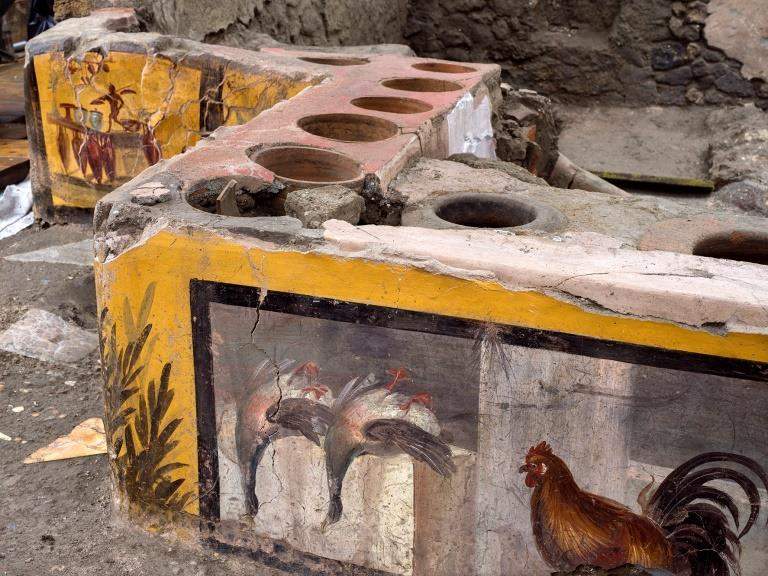The case of the documentary Pompeii ultima scoperta, broadcast on December 27, 2020 in prime time on Rai2, arrives in Parliament. Bringing the matter to the attention of the minister of cultural heritage, Dario Franceschini, are three deputies of the 5 Stelle Movement, namely Margherita Del Sesto, Vita Martinciglio and Luciano Cadeddu, who in their parliamentary question retrace all the stages of the affair surrounding the film, which was moreover able to achieve great success with the public (2,976,000 viewers, 11.4 percent share, which corresponds to almost double the average of Rai2 in prime time).
The documentary was preceded by a considerable media battage, triggered, the three parliamentarians recall, by the so-called “discovery” of a thermopoly in Regio V (actually ... already discovered in 2019), the news of which was spread, often without proper verification, by virtually all major national and international newspapers and television networks. Moreover, from the same preview of the documentary it was learned that the discovery dated back to March 2019.
“From a verification,” the three deputies write, "it was possible to establish that only that preview, lasting about eighteen minutes, was made by Rai Documentari, using footage and interviews related also to other excavation and restoration operations of the Pompeii site carried out between 2018 and 2020; the same director of Rai Documentari, the journalist Duilio Giammaria, had made several reports on the new archaeological discoveries of Pompeii for his television program Petrolio; the documentary broadcast by Rai2, however, is the result of an international co-production, of which the Archaeological Park of Pompeii would also be a part, and was made by the French company Gedeon Programmes in 2019, with the original title Les dernières heures de Pompéi, directed by Pierre Stine, first broadcast in March 2020 on France 5, with about two million viewers and, subsequently, screened in more than 50 countries around the world."
Del Sesto, Martinciglio, and Cadeddu recall, however, that the documentary “was purchased by Rai Documentari, which is not part of the co-production agreement, and according to press statements by director Giammaria the facility ’updated it with the in-house team’ inserting the aforementioned preview,” and that “during the airing of the original documentary, which lasted about 90 minutes, the ’Rai Documentari’ logo appeared 16 times, despite the marginal role of that structure.”
And again, the MPs report, "the narration was entrusted to the pro tempore Director of the Archaeological Park of Pompeii, Professor Massimo Osanna, the current Director General of Museums of the Ministry of Cultural Heritage and Activities and Tourism, who also retains the interim post of the same Park; the previous two docu-films by Rai Documentari(Food Revolution and Butterfly) had achieved rather poor audience results (respectively, 3.2 percent share with 746.000 viewers; 1.94 percent with 313,000 viewers); in addition, the aforementioned company Gedeon Programs, on December 10, 2020, announced through its website www.gedeonmediagroup.com that, for the first year, WCSFP (World Congress of Science and Factual producers), an association with 1,200 international broadcasters and producers, awarded 15 prizes to the best documentary productions in science, history, nature and society. Gedeon Programs received two nominations in the categories Best Multi-Format Project and Best Film in History, for its productions on the excavations of Pompeii; Gedeon was awarded for the documentary Les dernières heures de Pompéi and for the immersive exhibition Pompeii, held at the Grand Palais in Paris (July 1-October 28, 2020), produced in collaboration with the Archaeological Park of Pompeii, which attracted more than 200.000 visitors; to these two projects should be added the VR (virtual reality) Pompeii experience and the 12-episode educational web series Pompeii, sur les traces des Romains."
The three Pentastellati deputies therefore ask to know whether Minister Franceschini is informed of the facts outlined and what initiatives within his competence he intends to take to provide clarification on what is described in the introduction and on the formalized relationships existing between the Archaeological Park of Pompeii, Rai Documentaries and Gedeon Programmes.
 |
| Why did RAI on the Pompeii documentary play a marginal role? The case in Parliament |
Warning: the translation into English of the original Italian article was created using automatic tools. We undertake to review all articles, but we do not guarantee the total absence of inaccuracies in the translation due to the program. You can find the original by clicking on the ITA button. If you find any mistake,please contact us.